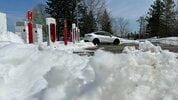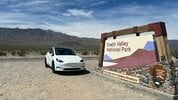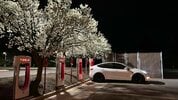Press release
Embracing Adventure: From Coast to Coast in a Tesla
Ukiah, California - April 2023 - In a spirited pursuit of adventure, I embarked on an epic cross-country journey from Northern California to the picturesque West Quoddy Head Lighthouse in Lubec, Maine. With a mere two weeks to spare before commencing a new chapter in my professional life, the open road beckoned, and I heeded the call.
Thirteen Days of Boundless Exploration
Over the course of thirteen exhilarating days, I covered an average of 628 miles each day. My journey began in the charming town of Ukiah, California, leading me south to Bakersfield and then eastward, venturing into the depths of Death Valley. After recharging, compliments of a stay at Harrah's in Las Vegas, I headed for the mighty continental divide, and then forging ahead through the heartland of America at a swift 85 miles per hour.
Efficiency and Convenience on the Road
No meticulous planning was needed for this road trip, the Tesla told me at each charging station how long I needed to charge to make it to my next stop. However, with the goal of minimizing charging time I typically would charge when the Tesla was about 20% State of Charge (SOC) . Typically, I covered about 90 miles before stopping to recharge for about 10 to 15 minutes--just long enough for bathroom breaks and snacks.
From Deserts to Snowstorms: A Whirlwind of Scenic Diversity
The journey unfolded with a backdrop of diverse and awe-inspiring landscapes. The route tested my mettle with scorching desert heat, torrential rainfalls, blinding snowstorms, and moments of breathtaking beauty that left an indelible mark on my memory.
East to West and Beyond
Reaching the easternmost point at West Quoddy Head Lighthouse in Lubec, Maine (most eastern point in the US), was a moment of triumph. However, the adventure was far from over. I then turned my gaze northwest, crossing into Canada with the ambitious goal of experiencing the renowned Trans-Canada Highway. This vital artery connects the eastern and western coasts of Canada, and I marveled at the preponderance of trucks on this vital route.
Seamless Supercharging and a Minimalist Budget
Throughout the journey, the longest stretch between Tesla superchargers was a mere 120 miles. With the dependable network of charging stations, I encountered no issues. Along the way, I utilized over 80 Tesla superchargers, enjoyed the convenience of two complimentary hotel L2 chargers, and, on one occasion, took advantage of 110 charging overnight. Remarkably, not a single Tesla supercharger was out of order during the entire trip. The total cost for supercharging came in at approximately $1,000.
Embracing the Future of Driving: Autopilot in Action
Autopilot technology took the wheel, managing more than 95% of the driving duties, rendering the journey a remarkably relaxing experience. The verdict was clear: road-tripping in a Tesla is not just feasible but an absolute delight.
In the age of electric mobility and with a spirit of adventure as my compass, my epic journey stands as a testament to the boundless possibilities and thrilling experiences that electric vehicles offer. The road less traveled becomes an open invitation, and I embraced it wholeheartedly, leaving a trail of stories and memories in my wake. The world is waiting to be explored, and a Tesla makes the journey an unforgettable experience.


Embracing Adventure: From Coast to Coast in a Tesla
Ukiah, California - April 2023 - In a spirited pursuit of adventure, I embarked on an epic cross-country journey from Northern California to the picturesque West Quoddy Head Lighthouse in Lubec, Maine. With a mere two weeks to spare before commencing a new chapter in my professional life, the open road beckoned, and I heeded the call.
Thirteen Days of Boundless Exploration
Over the course of thirteen exhilarating days, I covered an average of 628 miles each day. My journey began in the charming town of Ukiah, California, leading me south to Bakersfield and then eastward, venturing into the depths of Death Valley. After recharging, compliments of a stay at Harrah's in Las Vegas, I headed for the mighty continental divide, and then forging ahead through the heartland of America at a swift 85 miles per hour.
Efficiency and Convenience on the Road
No meticulous planning was needed for this road trip, the Tesla told me at each charging station how long I needed to charge to make it to my next stop. However, with the goal of minimizing charging time I typically would charge when the Tesla was about 20% State of Charge (SOC) . Typically, I covered about 90 miles before stopping to recharge for about 10 to 15 minutes--just long enough for bathroom breaks and snacks.
From Deserts to Snowstorms: A Whirlwind of Scenic Diversity
The journey unfolded with a backdrop of diverse and awe-inspiring landscapes. The route tested my mettle with scorching desert heat, torrential rainfalls, blinding snowstorms, and moments of breathtaking beauty that left an indelible mark on my memory.
East to West and Beyond
Reaching the easternmost point at West Quoddy Head Lighthouse in Lubec, Maine (most eastern point in the US), was a moment of triumph. However, the adventure was far from over. I then turned my gaze northwest, crossing into Canada with the ambitious goal of experiencing the renowned Trans-Canada Highway. This vital artery connects the eastern and western coasts of Canada, and I marveled at the preponderance of trucks on this vital route.
Seamless Supercharging and a Minimalist Budget
Throughout the journey, the longest stretch between Tesla superchargers was a mere 120 miles. With the dependable network of charging stations, I encountered no issues. Along the way, I utilized over 80 Tesla superchargers, enjoyed the convenience of two complimentary hotel L2 chargers, and, on one occasion, took advantage of 110 charging overnight. Remarkably, not a single Tesla supercharger was out of order during the entire trip. The total cost for supercharging came in at approximately $1,000.
Embracing the Future of Driving: Autopilot in Action
Autopilot technology took the wheel, managing more than 95% of the driving duties, rendering the journey a remarkably relaxing experience. The verdict was clear: road-tripping in a Tesla is not just feasible but an absolute delight.
In the age of electric mobility and with a spirit of adventure as my compass, my epic journey stands as a testament to the boundless possibilities and thrilling experiences that electric vehicles offer. The road less traveled becomes an open invitation, and I embraced it wholeheartedly, leaving a trail of stories and memories in my wake. The world is waiting to be explored, and a Tesla makes the journey an unforgettable experience.





